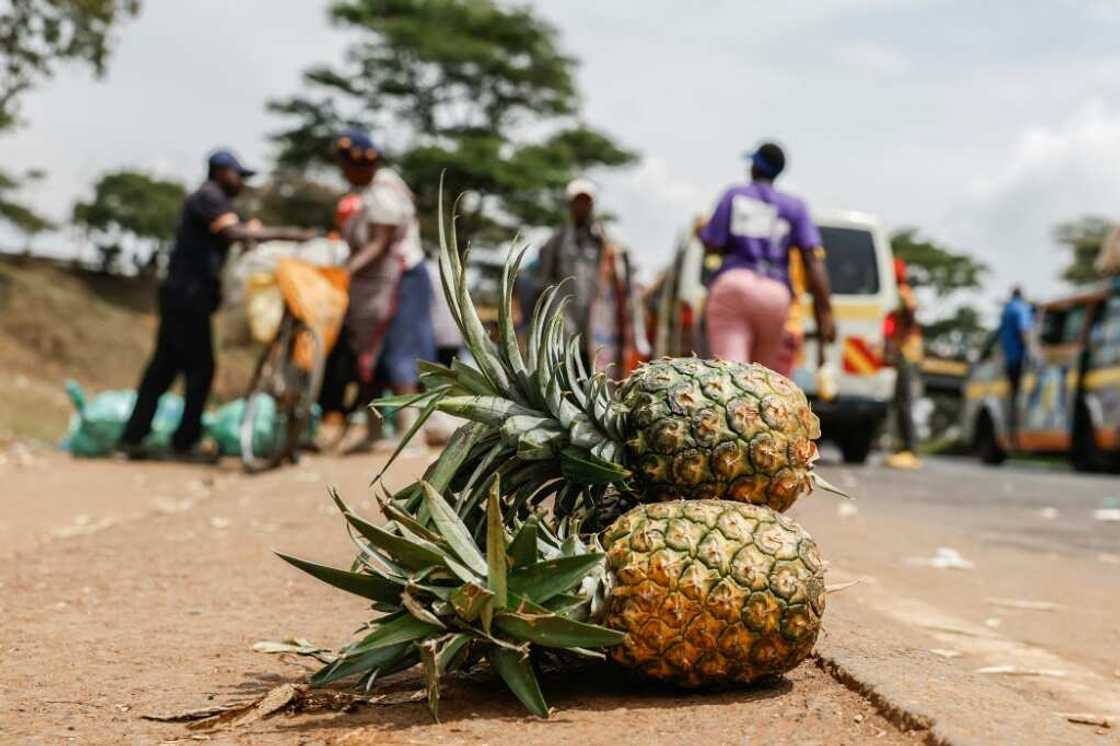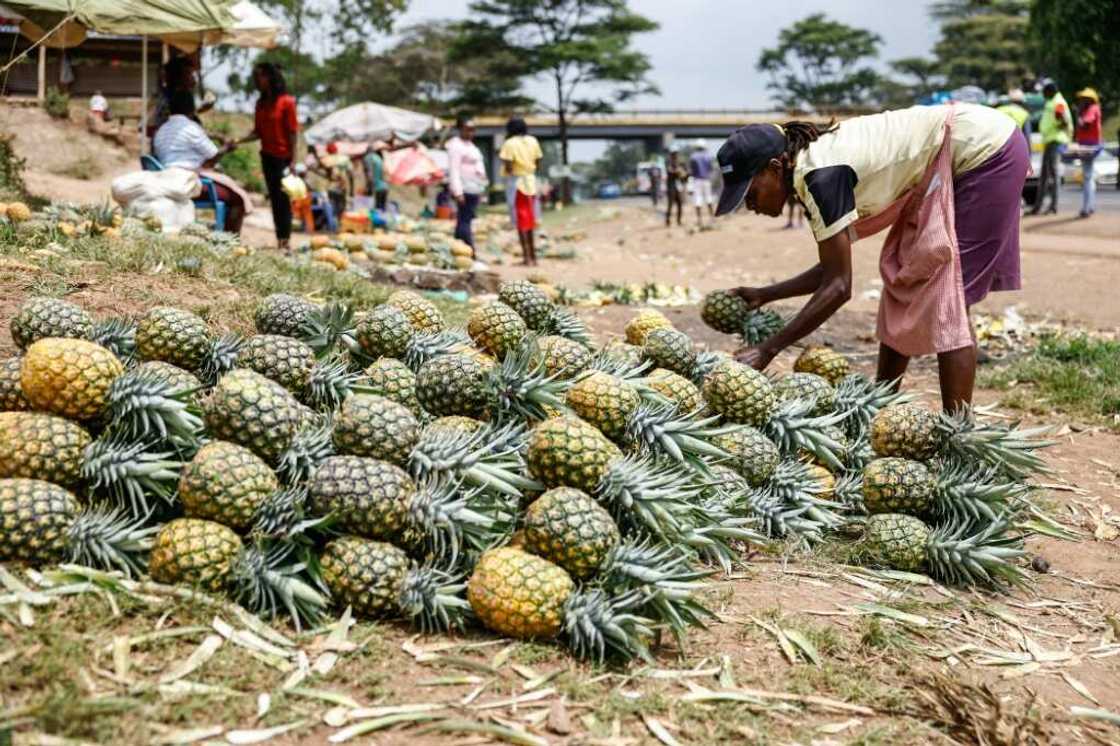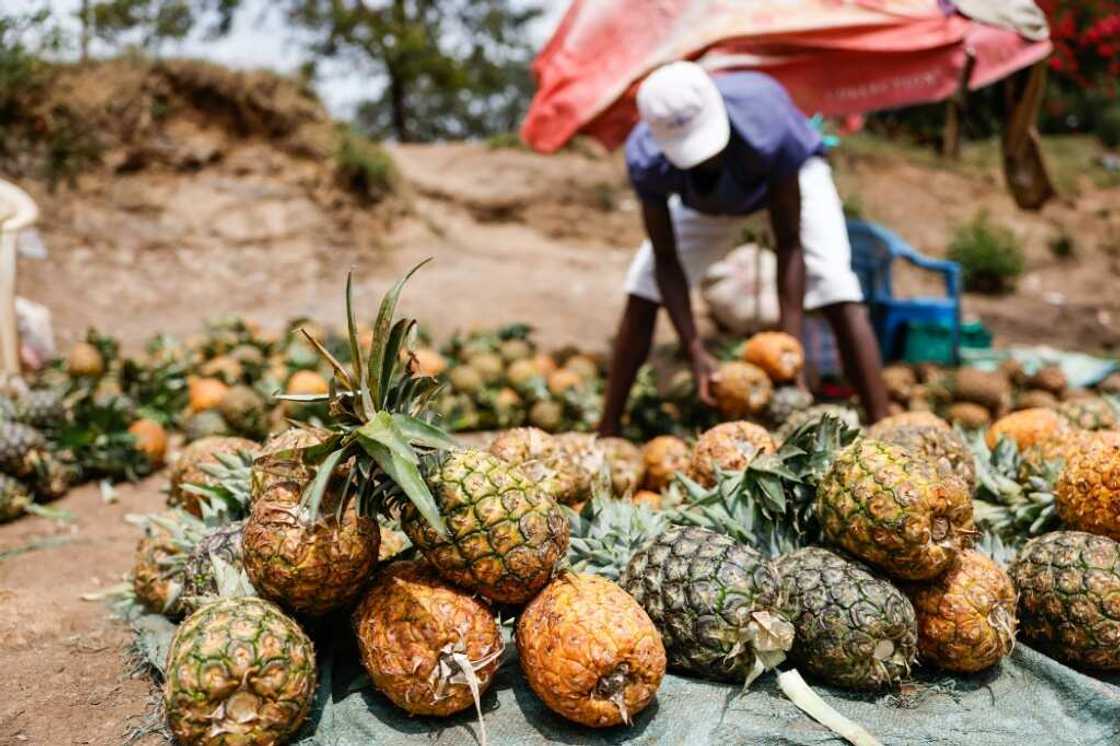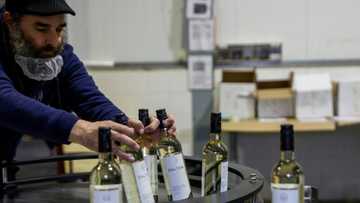Del Monte guards in Kenya accused of beatings, rapes, killings

Source: AFP
"The instructions were very clear: when you see a thief, you chase him until you arrest him and you beat him up brutally," says Daniel Kamau Wainaina, a former security guard on a Kenyan pineapple plantation owned by US food giant Del Monte.
The company is facing multiple accusations of assault, rape and murder by its guards at the vast farm northeast of the Kenyan capital Nairobi, some going back years.
Del Monte said it is ready to address the allegations in the Kenyan courts, and that it trusted they would be found to be "nothing more than disinformation campaigns by the plaintiffs and the media".
A lawsuit was filed at Kenya's High Court in December against Del Monte, representing two NGOs and 10 people who claim they or their relatives had been attacked by security guards employed directly by the company.
Earlier that month, police announced they were investigating the suspected murder of four men accused of trying to steal pineapples from the 10,000-acre (4,000-hectare) plantation.
AFP has spoken to several people at the site near the town of Thika who said they witnessed attacks by guards or were themselves victims.
PAY ATTENTION: Click “See First” under the “Following” tab to see Legit.ng News on your Facebook News Feed!
The multinational fruit and vegetable producer, which employs some 6,000 people in Kenya and has global sales of more than $4 billion, declined several requests by AFP for an interview to discuss the various claims.
'No foul play'
In a statement, Del Monte said it was "cooperating with the Kenyan authorities" over the four deaths in December.
It said CCTV footage "shows no foul play on Del Monte's part and instead shows the thieves running away towards the river, after dropping bags of stolen pineapple, as they tried to run away from security guards".
"Organised crime, particularly around pineapple theft, is becoming increasingly rampant in the area," it added.
Indeed, thefts are a frequent occurrence at the plantation, AFP journalists witnessed.
At the time of a guard rotation around 1:00 pm on two different days in January, AFP saw many youths, either on foot or on motorcycles, struggling to carry heavy bags full of stolen pineapples.
One man, aged in his 20s, told AFP he had been looking to steal pineapples along with the four men whose bodies were found dumped in a nearby river in late December.
"They (security guards) ambushed us and started yelling at us. When they caught up with us, they started beating us with metal bars and wooden sticks," said Buddy, who did not want to give his real name.
Buddy said he managed to hide in a bush but saw four others "were very badly beaten".
"After being beaten, it appears the guards thought they were dead. To hide the evidence, they threw their bodies into the river," he said.
Another self-confessed thief, also in his 20s and who wanted to be identified only as Ras, claimed to have witnessed the event and gave a similar account.
Two bodies were found on Christmas Eve, another two on Christmas Day. No charges have yet been laid over the incident.
'Multiple bruises'
In videos seen by AFP provided by a member of local community NGO Kagama, who was at the scene when the first bodies were discovered, the face of one victim appears swollen, with blood coming out of his nose and mouth.
"According to autopsy reports, the individuals died by drowning and there was no indication of foul play," Del Monte said.
AFP has seen a copy of the autopsy report on one of the victims, which concluded that death was caused by drowning, but noted there were "multiple scalp bruises extending to the face".

Source: AFP
The case is being monitored by the state-run but independent Kenya National Human Rights Commission (KNCHR).
"Our preliminary investigations reveal, beyond reasonable doubt, that the four men were attacked before they were forcibly drowned," senior KNCHR official Kamanda Mucheke was quoted as saying by the Daily Nation newspaper in late December.
According to a KNCHR investigator who spoke to AFP on condition of anonymity, the guards have "improved their methods".
"Before, they beat people up to death, and then dropped the bodies in the water. Now they beat people up and put the people who are still alive in the water but too weak to swim, so that the autopsies can conclude that the people drowned."
Wainaina said he worked for Del Monte for 25 years, mostly as a guard. The 58-year-old, who told AFP he had beaten pineapple thieves, was fired in 2016 over accusations of theft, which he denies.
"We used to get orders from above to beat... Otherwise, we were threatened with the sack."
Gerald Njoroge Mwangi said he worked as a guard on the plantation between 2010 and 2019. Although he maintains he has never hit anyone, he said he "witnessed many beatings".
"We are not trained to deal with thieves," he added.
In 2019, five Del Monte guards were prosecuted over the death of a quarry worker, Bernard Murigi Wanginye, 26, who had gone to steal pineapples.
The defendants, who pleaded not guilty and were fired by Del Monte, have yet to be tried.
'Impunity'
In a joint investigation published in June, Britain's The Guardian newspaper and the UK-based Bureau of Investigative Journalism reported on allegations of six murders at the plantation in the last decade.
British supermarket giant Tesco later announced it was suspending its supply of pineapples from Kenya.
Fellow UK supermarket chain Waitrose also said it had stopped selling pineapples from the Del Monte plantation from September.
The lawsuit filed on December 30 said locals had long been crossing the sprawling site, with the community claiming it as part of their ancestral lands.
This has led to "conflicts with the security personnel deployed by Del Monte, who assault, beat, torture, maim, rape and/or kill the trespassers", it said.

Source: AFP
Lawyer Mbiyu Kamau, who filed the lawsuit, denounced what he branded "impunity".
"The concern is that very little action has been taken against the Del Monte security personnel," he told AFP, adding that the lawsuit also targeted the Kenyan police authorities for failing to act as well as various government and legal bodies.
In its response sent to AFP, Del Monte said: "We believe in the Kenyan judicial system.
"We look forward to addressing allegations that have been levelled against us and others, including the Kenyan government, through the Kenyan courts, and look forward to the opportunity for all parties to present evidence in a public forum and trust that those proceedings will reveal the allegations to be nothing more than disinformation campaigns by the plaintiffs and the media."

Read also
Farmers now pay terrorists to protect them from other terrorists in Kaduna, Shehu Sani says
"We are constantly looking for areas where we can improve," it said, emphasising its "commitment to human rights".
Neither the local governor, county police nor the justice ministry responded to AFP's requests for comment.
'Left me for dead'
In the villages around the plantation, several people interviewed by AFP said they had been abused by Del Monte's guards.
Among them was boda-boda (motorcycle taxi) driver Simon Kamau Wamaitha, 33, who said he wanted to join the lawsuit against Del Monte.
He said that in October 2020 he was accosted by Del Monte guards as he was crossing the plantation while carrying a bag of coal.

Source: AFP
"The guards all pounced on me, they beat me mercilessly and released dogs on me and left me for dead," he said, showing where the tip of his nose had been injured.
Another alleged victim, whose name was changed to protect her identity, told AFP she was gang raped in 2002 by three guards when she was only 12 years old.
Brigitte, now in her 30s, said she had gone to the plantation with her mother to collect firewood.
"They asked me to take off my clothes, I refused. They forcefully undressed me, laid me on the ground and raped me in turns."
Brigitte, who said she had not even spoken to her husband about the alleged rape because of "shame", told AFP she was seeking reparations from Del Monte but has not filed a legal case.
'Brutal, systemic'
British law firm Leigh Day represents 134 people who say they were abused by Del Monte's guards, with some charges dating back to 2013.
The accusations include five cases of alleged rape and five deaths, as well as beatings, it says on its website.
"The allegations of human rights abuses by Del Monte's security guards in Kenya indicate a modus operandi designed to deter pineapple theft that is brutal and systemic and which is completely at variance with that of a business that respects human rights," said Richard Meeran, who represents the 134.
But the alleged brutality of the guards does not seem to deter the dozens of young men who go every day to steal pineapples to sell in the market for a few hundred shillings, just a few dollars.
"I'm searching for pineapple so I can sell to get some food to eat. Us, we don't have jobs," said Jackson, 25.
He said he had been beaten by guards in the past, showing a scar on his neck.
Does he fear them? "Of course I'm afraid," said Jackson, who admitted he started a life of petty theft at the age of 10.
Lawyer Kamau said the offences of theft and trespassing, which together are punishable by up to four years in prison, did not justify physical abuse.
And he said it should be the justice system that tries any suspected thieves.
"Whether this person is a thief or stealing or not, let the judge determine."
PAY ATTENTION: Stay Informed and follow us on Google News!
Source: AFP










